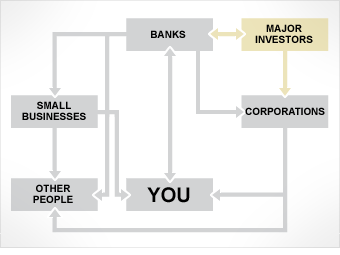Title The Bailout : How should you invest published to cocoa-touch.
Report sent to cocoa-touch. about The Bailout : How should you invest
This article is located at cocoa-touch.

the financial system is on the verge of collapse. But the complacency exhibited by many market pundits in the wake of the most wrenching episode in modern financial history is sufficiently shocking that it almost demands some scare-tactic response.
By our count some 300 articles were published last month telling investors "don't panic" or "not to panic." Urging calm is one thing. But too much soothing talk implies that there are no lessons to be learned. What's the use of a vertigo-inducing bout of market turbulence if the only conclusion is "stay the course"?
At the very least, it's a good reminder to take a hard look at your financial plans and to reevaluate how much market risk you can truly withstand in your portfolio. Because - don't panic! - this might not be completely over.
Richard Bernstein, the chief investment strategist at Merrill Lynch, worries that investors still don't appreciate the scope of the credit crisis.
"It's weird - the canary in the mineshaft has fallen over, and now everyone thinks there's a problem with canaries," says Bernstein, who, despite sounding the alarm about a global credit bubble as far back as 2006, could find himself out of a job after Merrill's forced sale to Bank of America. (Too bad Bernstein's Merrill bosses didn't heed his warnings.)
In Bernstein's eyes, the canary is the U.S. mortgage market, but the silent killer of loose credit was an international epidemic. "I don't perceive that most investors fully appreciate either the depth of the credit bubble or how broad-reaching it was in terms of emerging markets and hedge funds and commodities and all these other inflated asset classes that were dependent on easy credit," he says.
If consumers suddenly can't refinance their mortgages and credit cards and if more corporations can't issue bonds or tap lines of bank credit, their ability to weather any slowdown will be diminished. "The fundamentals are still extremely scary," says star financial-sector analyst (and recent Fortune cover subject
Credit remained hard to come by Thursday, even after the revised government bailout plan cleared the Senate, as investors waited to see if the bill can pass through the House.
The Senate on Wednesday night passed a financial industry rescue plan that was slightly changed from one rejected by the House just two days earlier.
The bill would allow the Treasury to buy up to $700 billion of troubled assets from financial institutions. Those assets, mostly mortgage-related, have caused the credit markets to seize up.
With loads of troubled assets on their balance sheets, banks are hesitant to take on more loans if the risk of default is high. Furthermore, when banks need to write down those assets, they have less cash on hand to issue loans. That stops the financial system's gears from turning, in turn hurting customers who need a loan to finance a home, a car or tuition. Frozen cash flows also affects companies' ability to make payroll, which can result in layoffs.
The major aim of the government's bailout plan is to free up banks to start lending again once their balance sheets are cleared of toxic holdings.
But as the legislation faces a tough second vote Friday by the House, credit remains tight.

Market gauges: One indicator of how willing banks were to lend to other banks, called the "TED spread," showed high prices of loans between banks. The TED spread measures the difference between 3-month Libor and the 3-month Treasury borrowing rates and is a key indicator of risk. The higher the spread, the bigger the aversion to risk.
On Thursday, the spread retreated slightly to 3.28% from 3.35% on Wednesday. On Tuesday, the measure surged as high as 3.53%, its highest level in more than 25 years. On Sept. 5, the TED spread was only 1.04%.
Furthermore, the difference between the decade-old 3-month Libor and the Overnight Index Swaps rose to an all-time record 2.55%, up from 2.44% Wednesday, according to data reported by Bloomberg.com. It's the fifth-straight record for the measure, showing that banks are hoarding cash rather than lending to one another.
The Libor-OIS "spread" measures how much cash is available for lending between banks, and is used by banks to determine lending rates. The bigger the spread, the less cash is available for lending.
.

Many on Wall Street and the rest of us are still digesting the momentous events of the last 10 days. Between one and three trillion dollars worth of financial assets have evaporated. Wall Street has been effectively nationalized. The Federal Reserve and the Treasury Department are making all the major strategic decisions in the financial sector and, with the rescue of the American International Group (AIG), the U.S. government now runs the world's biggest insurance company. At $700 billion, the biggest bailout since the Great Depression is being desperately cobbled together to save the global financial system.

What do you do now?
House rejects bailout: What should you do now? ... Vote: Are you glad the bailout bill failed? Video: ... If you've got it and wish to spend or invest it, opportunities abound.
more ...
go to website
Should you bail out spendthrift parents? - MSN Money
The Basics Should you bail out spendthrift parents? ... can also be a solution for parents who simply never learned how to budget or invest ...
more ...
go to website
Cached
Should You Invest in Berkshire? (Berkshire Hathaway) at SmartMoney.com
Bailout Bill Finalized ... Upgrades and downgrades provided by Briefing.com. You Are Viewing: Should You Invest in ...
more ...
go to website
Cached
A flood of foreclosures, but should you invest? - MarketWatch
A flood of foreclosures, but should you invest? Experts caution potential buyers to do their ... slide on day of gains for tech stocks; Congress goes back to drawing board on bailout ...
more ...
go to website
Cached
Should you invest in a ballplayer? - MSN Money
Extra 3/25/2008 12:01 AM ET Should you invest in a ballplayer? A minor-leaguer wants to give investors a chance to ... We need regulation; Who’ll bail out the Fed? Weston:
more ...
go to website
Cached
Senate backs reworked bailout plan
... want it or pay for mortgages that those poor people should never have received. Bailout? ... Do you think all non-Americans should look from 'the USA first angle'? When was the last ... less government from Canada writes: People can always invest ...
more ...
go to website
Source: Globe and Mail
NewsDateTime: 5 hours ago
Five Reasons We're in This Fix
... into these desperate financial days, wallowing in ill-defined, gargantuan bailout ... When you lower interest rates close to zero, borrowing money becomes almost ... People wonder if they should invest in the stock market or real estate. Look at Florida ...
more ...
go to website
Source: The Ledger
NewsDateTime: 57 minutes ago
The Bailout and Small-d Democratic Capitalism
... taxpayers of our country will actually own after they invest ... In the midst of all of this, we have a bailout package which says to the middle class that you are being asked ... in recent years, they should be asked to pay for this bailout. It should ...
more ...
go to website
Source: Nation
NewsDateTime: 21 minutes ago
Save the fat cats, even if they are jerks
If America wants to avoid Japan's decline, the House should approve a bailout, immediately. ... For those of you accustomed to bull markets, who think we're sure to come ... for several years, an American friend told me that he was going to invest in ...
more ...
go to website
Source: Seattle Post Intelligencer
NewsDateTime: 1 hour ago
Valley of dollars
With ace investor Warren Buffet promising to invest $5 billion in the ... Why should the governments intervene? Aren’t the markets supposed to ... If you think of it, the $85 billion bailout for AIG by the US government is the biggest nationalisation in ...
more ...
go to website
Source: Hindustan Times
NewsDateTime: 1 hour ago

Take some tax losses. If you buy and sell stocks in a taxable portfolio, it's likely that you have some holdings trading for well below what you originally paid. Our advice: Sell your losers pronto and book the capital losses.
Those losses can be carried forward from one tax year to the next (and the next and the next) and thus used to offset future capital gains whenever the market rebounds. Not only that, but Boston accountant Gale Raphael of Raphael & Raphael points out that taxpayers can deduct up to $3,000 in capital losses from ordinary income. That amounts to a tax savings of $990 a year to someone in the 33% tax bracket.
What if you think your losers are about to rebound? IRS rules prevent you from buying them back for 30 days. But if you can't wait, try using the proceeds from your tax-loss sale to purchase stocks similar to the ones you're selling.
If you take a loss on United States Steel, for instance, replace it with rival steelmaker Nucor (NUE
Market gauges: One indicator of how willing banks were to lend to other banks, called the "TED spread," showed high prices of loans between banks. The TED spread measures the difference between 3-month Libor and the 3-month Treasury borrowing rates and is a key indicator of risk. The higher the spread, the bigger the aversion to risk.
On Thursday, the spread retreated slightly to 3.28% from 3.35% on Wednesday. On Tuesday, the measure surged as high as 3.53%, its highest level in more than 25 years. On Sept. 5, the TED spread was only 1.04%.
Furthermore, the difference between the decade-old 3-month Libor and the Overnight Index Swaps rose to an all-time record 2.55%, up from 2.44% Wednesday, according to data reported by Bloomberg.com. It's the fifth-straight record for the measure, showing that banks are hoarding cash rather than lending to one another.
The Libor-OIS "spread" measures how much cash is available for lending between banks, and is used by banks to determine lending rates. The bigger the spread, the less cash is available for lending.
The Libor, or the London interbank offered rate, is a daily average of what banks charge other banks to lend money in London.
Treasurys: Rather than invest in other financial institutions with similar risky assets on their balance sheets, banks and common investors bought up government bonds. Treasurys are considered to be safer havens than stocks or commercial paper, as they are less volatile and guaranteed by the U.S. government.
The benchmark 10-year note rose 2/32 to 102-7/32 and its yield fell to 3.73% from 3.74% late Wednesday. Bond prices and yields move in opposite directions.
The yield on the 3-month bill - considered by many to be the safest investment - rose to 0.80% from 0.79% late Wednesday.
The 30-year bond rose 12/32 to 105-6/32 and its yield fell to 4.19% from 4.20%.
The 2-year note edged up 2/32 to 100-14/32 and its yield dipped to 1.79% from 1.82% Wednesday
Videos from YouTube
Title: NYC Wall St. Bailout Protest 25 September 2008
Categories: News,stock,street,bailout,protest,market,bush,nyc,wall,bank,
Published on: 9/27/2008 3:00:58 AM
Title: Karl Rove Reacts to the No Vote on the Bailout!
Categories: Nancy,Bailout,News,Pelosi,Fox,Rove,News,Gibson,Karl,John,House,
Published on: 9/29/2008 5:58:47 PM
Title: Congressman Ron Paul Schools Bernanke on the Bailout Plan
Categories: Price,Monetary,Wall,Bail,Constitutionality,News,Bailout,Ron,Bernanke,Street,Out,Authority,Debt,Fixing,Federal,Paul,Depression,
Published on: 9/24/2008 11:32:51 AM
Title: Palin: Bailout is about healthcare!
Categories: News,bailout,couric,news,cbs,thinkprogres,healthcare,palin,
Published on: 9/25/2008 11:25:46 AM
Title: Let's Play "WALLSTREET BAILOUT" The Rules Are... Rep Kaptur
Categories: military,economy,congress,taxcuts,gitmo,habeas,News,congresswoman,relief,mama,bush,kaptur,iraq,cheney,bill,corpus,
Published on: 9/22/2008 8:03:52 PM




No comments:
Post a Comment